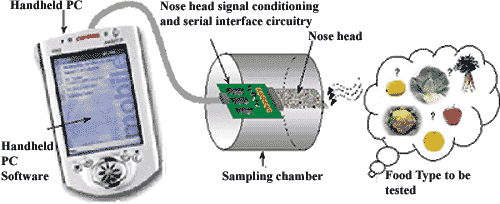| 2003 |

|
YEAR BOOK |
University of Limerick
|
Development of a handheld intelligent food safety control instrument using electronic nose sensors fabricated from nano-technology materials
|

For people involved in the food industry who, through legislation, have a responsibility to ensure food quality and safety in all aspects of their business, the hand-held electronic nose is an essential tool for monitoring the freshness or ripeness of foods and checking the integrity of packaging. The objective of this project is to deliver a prototype hand-held electronic instrument with an integrated electronic 'nose' that will offer a cost-effective solution to the on-site measurement of the aroma pattern of one selected food type. The device will be useful in assisting the food industry to meet food safety regulations by establishing the fitness of the food product for human consumption.
Unlike other commercially available devices that have inadequate levels of odour discrimination and response times useful for routine testing, advanced nano-technology sensors are developed to realise a performance approaching that of high-end systems. The application of a novel design and the development of faster pattern recognition algorithms reduces analysis times to less than ten seconds. The outcome will include a tested prototype for exploitation by a start-up company and a design protocol for expansion into other areas.
The short-term goal is to develop the prototype of a consumer-friendly instrument that can be used to measure the aroma of one food item by its smell on a threshold basis, to determine its suitability for human consumption. The medium-term goal is to broaden the capabilities of this prototype to handle other foods. The long-term goal is to expand on the developments to produce a product that can detect the aromas found in other industries, such as those in the medical and environmental sectors.
This project will address the short-term goal. The initial prototype will be designed as a pass/fail detector with audit trail facilities that can be used as an aid to activities such as stock rotation and the implementation of food safety regulations associated with the chosen food item. The Irish food sector will be specifically targeted in light of the ever-increasing stringencies placed on food safety when dealing with the sale of fruit, fish, meat, poultry etc.
The project will deliver:
a) An intelligent hybrid nano-particle detector module comprising an array or gradient of odour sensors with in-built temperature and humidity sensors for self-compensation.
b) A sensor head with appropriate signal conditioning circuitry that can be connected to a reseller's Pocket PC (such as a Compaq iPAQ�). This will have the following functions and features:
|
� Power management circuitry
� Alphanumeric LCD (Liquid Crystal Display) with backlight for real-time indication of readings on the Pocket PC screen � Self calibration and background 'noise' elimination facilities � PC interface for data transfer � Off-the-shelf hand-held gas sampler system that will contain the sensor array � Microprocessor-based neural network pattern recognition with self-learning capabilities for the discrimination of odours. |
c) Documented pattern recognition software algorithms.
d) Documented 'fingerprint' sensor patterns that represent different odours.
e) A platform, skill-base and protocol to create a multi-disciplinary team, with expert knowledge, for the development of electronic noses in other applications, in tandem with the establishment of Ireland as a member of the new NOSE II network of excellence on artificial olfaction.
f) A plan for patent portfolios, some of which may be based on existing patents.
g) Publications on findings after disclosure.
h) Final prototyping, pre-production and commercialisation plans.
Contact: Professor Khalil Arshak, Assistant Dean of Research, College of Informatics & Electronics, University of Limerick; Tel: +353-61-202267; Fax: +353-61-338176; E-mail: [email protected]